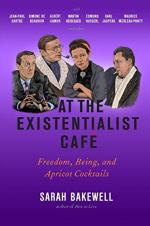|
This section contains 2,023 words (approx. 6 pages at 400 words per page) |

|
Writing
Throughout the text, Bakewell portrays the act of writing as a way to reinterpret and thus reshape one’s world. The preeminent conflict and following resolution of it in Sartre’s breakout novel, Nausea, illustrate this. The protagonist, Roquentin, is a biographer and travels to a nearby town to research a figure to write about. While there, he feels a lack of order and connection in the events of his life, and he feels overwhelmed with nausea and almost insane. He feels bothered by each individual experience and observation, because they no longer have meaning or sense. However, he later realizes that art will restore that connection among the chaos. The novel ends with him deciding to “write— not a biography, but a different kind of book that will be beautiful and hard as steel” (102). In this way, he will restore order to his life by lending his...
|
This section contains 2,023 words (approx. 6 pages at 400 words per page) |

|




